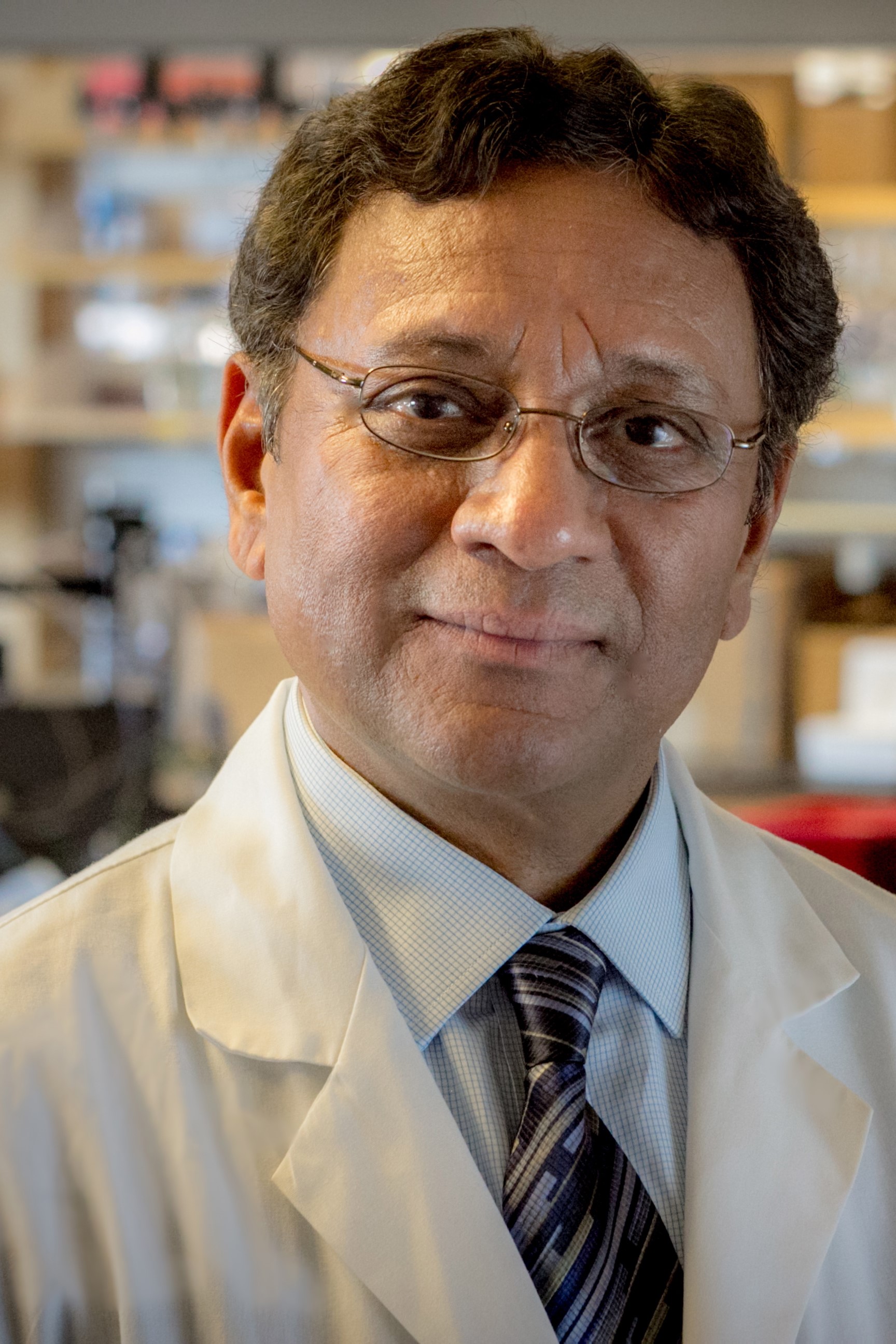Dr. Nafees Ahmad received his BS (Hons) in Chemistry and MS in Biochemistry from one of the prestigious central universities in India, The Aligarh Muslim University. He then joined another renowned research institute, The Central Drug Research Institute, Lucknow, India, from where he earned his Ph.D. in 1983. Dr. Ahmad did his Postdoctoral Fellowship at the National Institutes of Health (NIH), Bethesda, Maryland, USA from 1985-1990 in the Laboratory of Molecular Microbiology, National Institute of Allergy and Infectious Diseases. His research primarily focused on the regulation of HIV-1 gene expression and replication, especially the role of HIV-1 regulatory and accessory proteins in HIV-1 replication and biology. In 1990, a group of scientists from the NIH, including Dr. Ahmad moved to J.N. Gamble Institute of Medical Research, Cincinnati, Ohio to start a new program on Molecular Virology, including his own independent research program on molecular mechanisms of HIV-1 mother-to-infant transmission. In 1994, Dr. Ahmad joined the University of Arizona College of Medicine – Tucson’s Department of Microbiology and Immunology (now Immunobiology). His research involves understanding the molecular mechanisms of differential HIV infection in infants and adults and vertical transmission and pathogenesis. In addition, he directs the Immunity and Infection block of the medical curriculum of the College of Medicine – Tucson. Teaching Dr. Ahmad's major teaching responsibilities include serving as the director, instructor and facilitator of the Immunity and Infection (I&I) block (MED 822, 9 units) for 110-120 second year medical students. In addition, I serve as a facilitator in several other blocks, including Prologue (MED 814, 2 units), DMH (MED-820, 14 units), Life Cycle (MED-821, 9 units), and Advanced Topics (MED-823, 9 units) of the College of Medicine – Tucson. Immunity and Infection Block covers multiple disciplines, including Immunology, Virology, Bacteriology, Mycology, Parasitology, Adult and Pediatric Infectious Disease, Pathology, Pharmacology, Nutrition, Bioethics, Bioterrorism, Humanisms and Global, National & Local Public Health and various departments such as Immunobiology, Pathology, Pharmacology, Medicine, Pediatrics, Physiology, Cell Biology & Anatomy, Nutrition, Family and Community Medicine and Public Health. At the graduate level, he teachs a 3-unit Molecular Virology (IMB 580) course to graduate students. He also direct a 3-unit Graduate Medical Microbiology (IMB-510) Course as well as teach the Virology section of this course. Furthermore, he supervises medical, undergraduate and graduate students for research in his laboratory. Dr. Ahmad has received several awards and recognition for teaching at the University of Arizona. Lifetime Educator of the Year Award for Medical Education, Years I and II, College of Medicine – Tucson, University of Arizona. Member, Academy of Medical Education Scholars (AMES), College of Medicine – Tucson, University of Arizona Outstanding Teacher in a Block, 2011, Year II, Immunity and Infection, College of Medicine – Tucson, University o Dean’s List for Excellence in Teaching, 2010 – Year II Award for Immunity and Infection, College of Medicine – Tucson, University of Arizona Dean’s List for Excellence in Teaching, 2009 – Year II Award for Immunity and Infection, College of Medicine – Tucson, University of Arizona Outstanding Teacher in a Block, 2008, Year II, Immunity and Infection, College of Medicine – Tucson, University of Arizona Vernon and Virginia Furrow Award for Excellence in Basic Sciences Teaching for Medical Students, 2006, College of Medicine – Tucson, University of Arizona Dean's List for Excellence in Teaching in the Basic Sciences, 2002, College of Medicine – Tucson, University of Arizona Dean’s Teaching Scholar Award, 1998-1999, Arizona Health Sciences Center Memberships Academy of Medical Education Scholars Bio5 Institute Textbooks Sherris Medical Microbiology, 5th Edition, McGraw Hill Research Molecular Virology The main focus of Dr. Ahmad's laboratory is to understand the molecular mechanisms of differential HIV-1 infection in neonatal and adult target cells as well as HIV-1 vertical transmission. Areas of investigation include: role of viral and host factors associated with a higher viral load and rapid AIDS progression in neonates/infants compared with adults; identification and characterization of host factors influencing differential HIV-1 infection and gene expression in neonatal (cord) blood mononuclear cells vs. adult cells; role of HIV-1 integration in differential HIV-1 gene expression and replication in cord vs. adult cells; mechanisms of differential HIV-1 infection in neonatal macrophages and naïve/memory T-cells vs. adult cells; molecular and biological characterization of HIV-1 involved in vertical transmission and disease progression; viral determinants, including viral heterogeneity, functional conservation/divergence of various HIV-1 genes, presence/absence of motifs in HIV-1 genes, replication efficiency, cell tropism, cytopathic effects, and coreceptor utilization associated with HIV-1 maternal-fetal transmission and pathogenesis; development and evaluation of anti-HIV-1 agents, including HIV entry inhibitors and inhibitors from natural products. Selected Publications Sundaravaradan, V., Mehta, R., Harris, D. T., Zack, J. A., and Ahmad, N. Differential expression and interaction of host factors augment HIV-1 gene expression in neonatal mononuclear cells. Virology 400:32-43, 2010. PMID: 20138641 Ahmad, N., Mehta, R., Harris, D.T. HIV-1 replication and gene expression occur at higher levels in neonatal naïve and memory T-lymphocytes compared with adult blood cells. Virology 413:39-46, 2011. PMID: 21353282 Wellensiek, B., Ramakrishnan, R., Sundaravaradan, S., Mehta, R. and Ahmad, N. Differential HIV-1 integration targets more active genes in neonatal than adult blood mononuclear cells. Virology 385: 28-38, 2009. PMID: 19100594


